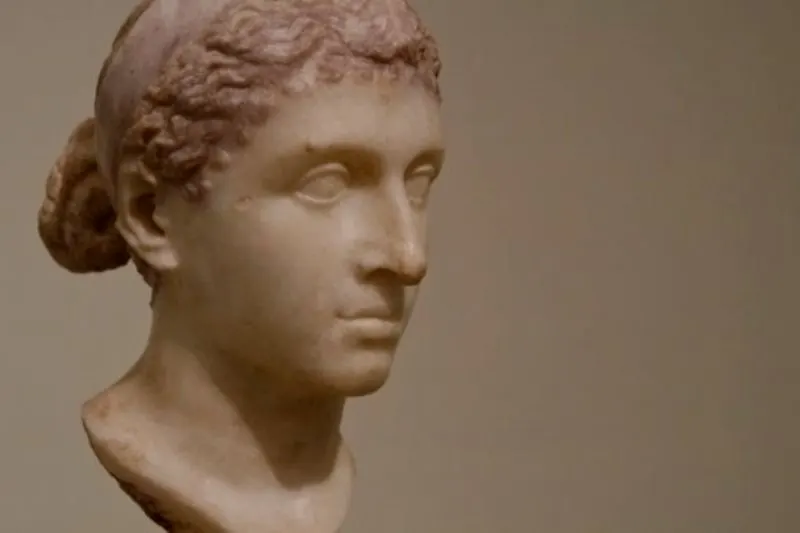Cleopatra: The Last Pharaoh and Her Influence on Egypt and Rome
Cleopatra VII Philopator, commonly known as Cleopatra, is one of the most famous figures in history. She was the last pharaoh of Egypt and is remembered for her intelligence, beauty, and political savvy. Her reign was marked by tumultuous events that shaped the course of ancient history, and her influence on both Egypt and Rome was profound. In this essay, we will explore the life of Cleopatra, her impact on Egypt and Rome, and the legacy she left behind.
Early Life and Rise to Power
Cleopatra was born in 69 BCE in Alexandria, Egypt. She was the daughter of Ptolemy XII Auletes, the pharaoh of Egypt, and his wife Cleopatra V Tryphaena. Cleopatra was the third child and had two older sisters, Berenice IV and Cleopatra VI, as well as a younger brother, Ptolemy XIII. She was educated in Alexandria, where she learned to speak several languages, including Egyptian, Greek, and Latin. Cleopatra was also trained in political science and military strategy, skills that would serve her well later in life.
Cleopatra's father died in 51 BCE, and he left the throne to his eldest daughter, Berenice IV. However, Berenice's reign was short-lived, and she was overthrown by her younger brother, Ptolemy XIII, with the help of their advisors, Pothinus and Achillas. Cleopatra was forced to flee Egypt and seek refuge in Syria. She was determined to reclaim her throne and enlisted the help of Julius Caesar, the Roman general, to help her.
In 48 BCE, Cleopatra returned to Egypt with Caesar's help and defeated her brother's army. She became the sole ruler of Egypt and was crowned pharaoh. Cleopatra then formed a romantic relationship with Caesar and bore him a son, whom they named Caesarion. However, Caesar was assassinated in 44 BCE, and Cleopatra's future was once again uncertain.
Cleopatra and Mark Antony
After Caesar's death, there was a power struggle in Rome, and the Second Triumvirate was formed between Mark Antony, Octavian, and Lepidus. Mark Antony was appointed ruler of the Eastern provinces, which included Egypt. In 41 BCE, Cleopatra visited Mark Antony in Tarsus, and the two became lovers. Cleopatra gave birth to twins, Alexander Helios and Cleopatra Selene, and a third child, Ptolemy Philadelphus.
Cleopatra and Mark Antony's relationship was more than just a love affair. They formed a political alliance that threatened Rome's power structure. Antony divorced his Roman wife, Octavia, and married Cleopatra, which was seen as an act of treason in Rome. Octavian, who was Caesar's heir, saw Antony as a threat to his own power and declared war on him.
The Battle of Actium
In 31 BCE, the forces of Octavian and Antony met in the Battle of Actium. Cleopatra commanded her own fleet and fought alongside Antony. However, they were defeated, and their forces were forced to retreat to Egypt. Octavian pursued them, and in 30 BCE, he captured Alexandria. Antony committed suicide, and Cleopatra followed suit soon after.
Legacy
Cleopatra's reign was marked by significant political and cultural achievements. She was a skilled diplomat and maintained good relations with Rome while also preserving Egypt's sovereignty. She also introduced several administrative and economic reforms that helped to stabilize the country.
Cleopatra's legacy continues to inspire fascination and intrigue, even today. Her life has been the subject of numerous books, movies, and television shows, and she has become a symbol of female power and intelligence. Her impact on Egypt and Rome was profound, and her story has inspired countless people over the centuries.
In Egypt, Cleopatra is remembered as one of the greatest pharaohs in the country's history. She was the first ruler of Egypt to speak Egyptian and to be crowned as a pharaoh alongside a male co-ruler. She was also known for her patronage of the arts, and during her reign, Alexandria became a cultural center of the ancient world. She was a supporter of Egyptian religion and worked to promote its revival, which helped to strengthen her legitimacy as a pharaoh.
In Rome, Cleopatra was viewed with suspicion and fear. She was seen as a threat to Roman power and was portrayed in the Roman media as a seductress who used her beauty to manipulate men. This image of Cleopatra as a temptress has persisted over the centuries and has been perpetuated in art, literature, and popular culture.
However, recent scholarship has challenged this image of Cleopatra and has highlighted her intelligence, political acumen, and diplomatic skills. She was a shrewd negotiator who was able to maintain good relations with Rome while also preserving Egypt's independence. She was also a master of propaganda and was able to shape her image to her advantage.
In conclusion, Cleopatra was a remarkable figure who left an indelible mark on both Egypt and Rome. Her intelligence, beauty, and political savvy have inspired countless.
Exploring the history and legacy of Cleopatra, the last pharaoh of Egypt, is an unforgettable experience that offers a glimpse into the ancient world and the enduring legacy of female leadership. Book our Egypt vacations today and discover the secrets of this fascinating figure and the impact she had on both Egypt and Rome.


.jpg)

.jpg)
.jpg)









